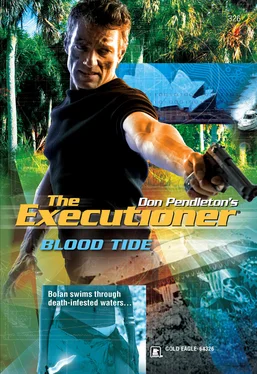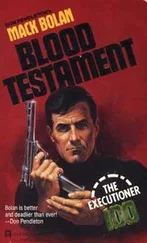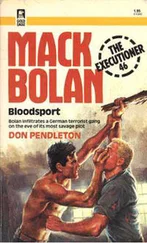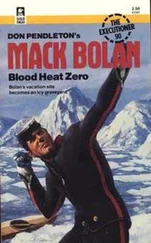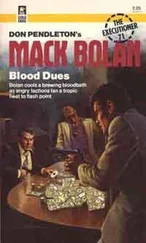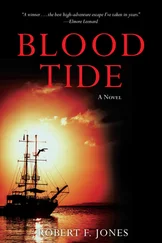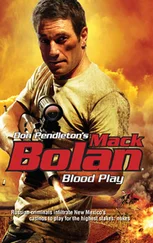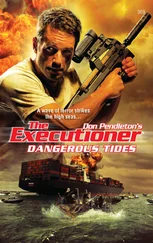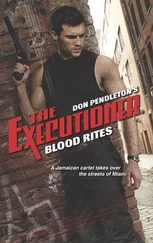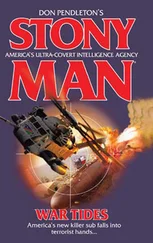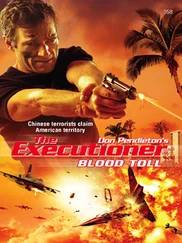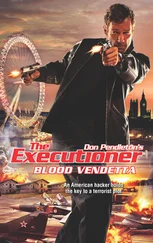“Any other religious corroboration?”
“They were all wearing religious charms that supposedly ward off the blows of the enemy.”
Bolan leaned back in his chair and let the water trickle around his feet. “So they’re textbook juramentado.”
“Well, technically speaking, you run juramentado, it’s an activity, not a person. In the Moro dialect, what they actually call themselves is mag-sabils.”
Bolan almost didn’t want to know. “Which means?”
“Those Who Endure the Pangs of Death.”
“Swell.” Bolan finished his beer. “I can buy a revivalist juramentado movement here in the Sulu Archipelago. It’s where the pastime was founded, but we’ve had similar attacks from New Guinea to the west coast of Thailand.”
“That is disturbing,” Mei agreed.
“What about your contacts in Philippine Intelligence?”
“They haven’t found much. Whatever this movement is, it’s highly secretive. It’s hard to get operatives into the Muslim movements. Trust me, I’ve done it, and it isn’t easy. Most of the power and wealth in the Philippines is concentrated in the hands of the Catholic majority in the big cities of the north. The Muslims tend to be rural, and most live in the southern islands.
Philippine Military Intelligence was built on the U.S. model, but the Philippine military was still based on patronage and loyalty to individual generals, and most of its assets were in the north. The military was clannish, and interservice cooperation was dismal, at best. For the most part, intelligence gathering consisted almost entirely of bribing informants or sending special operations commandos to shoot up suspicious villages and torture suspects. Neither tactic was ideal against fanatic terror cells.
Bolan stared out across the bay. “I need to get inside.”
Mei rested her chin in her hands. “That, Blue-eyes, is something I’d like to see.”
Bolan had to admit to himself it would be a challenge. “So we have nothing else on this end?”
“Like I said, Philippine Intelligence thinks there might be a movement in the southern islands, but there are always movements in the southern islands. That’s were al Qaeda, the separatists, and every other violent group in the Philippines does their recruiting.”
“Someone has to know something.”
Mei gazed out over the water reluctantly.
Bolan read her look. “You have an idea.”
“I know a guy who makes it his business to know things. He owes me a favor.” She frowned. “But this may be stretching the mark to the breaking point.”
“Maybe we should go have a talk with this guy.”
“This guy’s a real wild card.” Mei’s frown deepened. “I don’t know if you want to get in bed with him.”
Bolan shrugged. “I usually don’t get in bed with anyone on the first date.”
Mei burst out laughing.
“What’s so funny?”
Mei waggled her eyebrows. “You’ll know when you meet him.”
“I don’t get it.” Bolan finished his beer. “And I’m not sure I want to.”
Macao
Bolan stepped off the hydrofoil that had taken them from Hong Kong to the estuary of the Pearl River and onto the waterfront. At first glance, Macao looked like every other economically emerging city in Asia. Construction was everywhere. High-rise apartments and office buildings relentlessly clawed their way into the skyline. The streets were jammed with traffic, and hellish pollution surrounded them in the three dimensions of the air, the water and the streets. Casinos jammed the waterfront, and tourists crowded the casinos to overflowing.
Rickshaw men pounced on disembarkees from the hydrofoil, each working for a casino and affiliated hotel. Marcie Mei ignored them as she curled her thumb and forefinger against her teeth and let out a whistle that could have hailed a cab all the way from Manhattan.
A small man with massive calves and the shoulders of an ox looked up from his lunch. He took up the yoke of his rickshaw and trotted over to the pier. He and Mei spoke in rapid-fire Cantonese for a moment, and the woman gestured at Bolan. “Du, this is Cooper. Cooper, this is Du. There’s hardly anything I don’t owe Du, including my life.”
Du grinned up at Bolan through gold teeth and stuck out a callused hand that seemed too big for his body. His English had strange inflections. He spoke his English more like a Brazilian than Chinese. “How you doin’, hot rod?”
Bolan shook Du’s hand. The rickshaw man squeezed, testing Bolan’s strength. The calluses spread across his knuckles as well as his palms. Bolan suspected he hadn’t developed them from pulling carts. The Executioner smiled and squeezed back. “Nice to meet you, Du.”
Du grinned. He and Bolan silently agreed not crush each other’s hands and relaxed their grips. Du grabbed what little baggage there was and threw it in back as Bolan and Mei climbed aboard. He took up the yoke and swiftly pulled his passengers away from the waterfront and into the sprawl. He chattered back over his shoulder, pointing out the sights.
He jerked his head off toward a tower of glass. “The Hilton?”
Mei sank back against Bolan. “Head for Rua da Felicidade.”
Bolan perked an eyebrow. “The Street of Happiness?”
Mei nodded.
“Awww…man!” Du shook his head as he trotted past cars, bikes and scooters, and swerved around an ox. “Tell me you’re not going to Ming’s.”
“Directly,” Mei confirmed. “We’re expected.”
Du hunched his shoulders fatalistically and turned away from the glass and light of the downtown sprawl.
Macao was unique among Chinese cities in that it had once been a Portuguese possession. Once they pulled onto the Rua da Felicidade, they might as well have been in prewar China. Mediterranean architecture abutted ancient style Chinese houses and shops. The Rua da Felicidade had once been Macao’s red light district. Now the street was lined with shops and street vendors and food stalls. The bright colors of silk were everywhere as were the smells of spices and roasting meat. For all of China’s gustatory glory as one of the world’s great cuisines, the art of barbecue was almost unknown there. Except in Macao. The Portuguese had brought their grills with them, and to this very day smoke filled the air. They passed a bamboo cage filled with a half dozen small, tapir-like animals. A metal trough lined with live coals and multiple spits glowed red hot and ready next to them. Bolan suspected few of the beasts would survive the lunch-time rush.
Bolan crooked two fingers and thrust out a note as the rickshaw passed a stall. Marcie’s eyebrows shot in surprised approval as Bolan took two sheets of au jok khon wrapped in paper. The barbecued strips were a sweet, salty, cholesterol blowing form of pork-jerky sheathed in crispy fat.
Du pulled past the shops and took them deeper into the maze.
Bolan thought about their contact. He had consulted Kurtzman via satellite and was surprised Kurtzman had come up goose eggs. Neither the Farm, US, nor British Intelligence had anything on the man. He was an enigma.
Ming Jinrong was a part of the Chinese underworld.
Mei had been very closemouthed about the man. He was a valuable resource, and she was taking pains to protect him.
Bolan decided to try again. “What can you tell me about Jinrong?”
“I’ve had some dealings with him. He was Red League in Shanghai, but his…proclivities kept getting him in trouble, and he had to flee. He’s been in Macao for twenty years,” she said.
Bolan considered the tidbit of information. He had fought the Chinese triads before. The Red League was a secret society that had begun as a patriotic anti-Manchu organization of martial artists and merchants dedicated to the overthrow of the Qing Dynasty centuries ago. Like most of the other secret societies in China, as the ages passed, they had become runners of opium, heroin and prostitutes. They had taken their place as the heads of Chinese gambling, extortion, assassination and political manipulation.
Читать дальше
